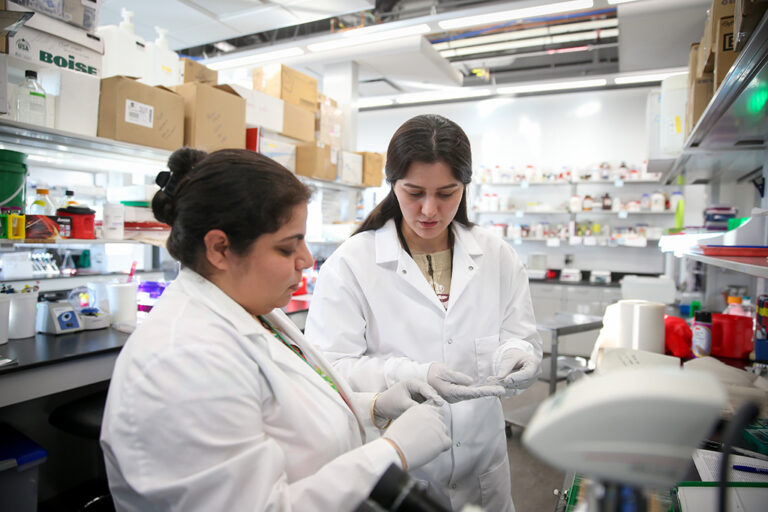SMHS announces research awards totaling more than $2.7 million from multiple faculty
As the trees bloom on the UND campus this summer, you’ll be a bit harder-pressed to find health professions students wandering the halls of the UND School of Medicine & Health Sciences (SMHS), due to the summer vacation for some. But that brief, modest lull in teaching means more time for the School’s research programs to heat up.
Several SMHS faculty were awarded research grants in recent months, allowing researchers at the School to dive into several new and continuing projects this summer, including studies on cancer, cloud-based learning, allergies, and more. Here is a brief round-up of research projects ramping up now:
In May, Kumi Nagamoto-Combs, Ph.D., assistant professor with the Department of Biomedical Sciences, was awarded a $1.8 million, five-year R01 grant through the National Institute of Allergy and Infectious Diseases of the National Institutes of Health (NIH). This research award will be used to explore the link between food allergies and neurodegeneration. R01 grants are the highest award researchers can receive from the NIH and are given for mature research projects that are hypothesis-driven with strong preliminary data. Recent results from Dr. Nagamoto-Combs’s lab suggest that food allergens can trigger neuroinflammation and behavioral changes in a mouse model of cow’s milk allergy, even in the absence of severe immediate reactions. Neurodegenerative pathologies are evident especially after repeated allergen consumption, likely contributing to the anxiety- and depression-like behavior the allergic mice exhibit. The project will determine the role of immune cells in these allergy-associated changes in the brain and behavior.
Also in May, Tim Casselli, Ph.D., research assistant professor with the Department of Biomedical Sciences, was awarded a $70,500 NIH R03 grant to study Lyme Disease. Lyme disease, which is caused by infection from the tick-borne pathogen Borrelia burgdorferi, can lead to inflammatory diseases affecting the joints, heart, and nervous system. As there are no vaccines or effective vector controls against the infection, Lyme disease is and will continue to be a significant public health concern. The overall goal of Dr. Casselli’s project is to identify candidate B. burgdorferi targets for prophylactic and therapeutic treatments for Lyme disease.
More recently, Sandeep Singhal, Ph.D., assistant professor in the Department of Pathology, received a one-year, $200,000 grant from the National Institute of General Medical Sciences (NIGMS) to build cloud-based learning modules for biomedical research together with Google and Deloitte Consulting. As the NIGMS puts it, “Biomedical research is increasingly dependent on access to and analysis of large and complex datasets. Cloud computing enables efficient data analysis and management without upfront investment in high-performance computing infrastructure and maintenance by individual user institutions.” To that end, this grant will help Dr. Singhal to help convert biomedical research training materials—e.g., microscopy slides, genomic studies, phylogenetic algorithms, and artificial intelligence—into cloud-based learning modules.
In the world of cancer research, Gary Schwartz, Ph.D., M.P.H., Ph.D., professor and chair of the Department of Population Health—along with his Population Health colleague Marilyn Klug, Ph.D., and Soojung Kim, Ph.D., M.P.H., associate professor and graduate director of the Department of Communication—was awarded a two-year, $100,000 grant from the Prevent Cancer Foundation. The grant will allow the team to further study the effects of novel radon-education smartphone application on radon testing in the upper-Midwest.
Finally, earlier this year the Department of Biomedical Sciences secured from the NIH a five-year, $500,000 renewal of its INMED: NEUROscience project. The Indians Into Medicine (INMED): Native Educator University Research Opportunity (NEURO) science project, a collaboration between INMED and the Department of Biomedical Sciences Departments, is an eight-week professional development program for high school science teachers in tribal schools. The program’s goal is to provide research experience in biomedical science, while also providing science, technology, engineering, and mathematics (STEM) pedagogy training. This summer research experience is for middle and high school teachers in American Indian tribal schools. This professional development program is focused on understanding the process of science and translating it into relevant science pedagogy. The program aims to build teachers’ capacity to create engaging and meaningful learning environments that excite, support, and instill confidence in American Indian students, in an effort to help them overcome some of the obstacles they face on the path to becoming STEM professionals. The 2022 NEUROscience program is underway right now under the direction of UND Chester Fritz Distinguished Professor Holly Brown-Borg, Ph.D.


